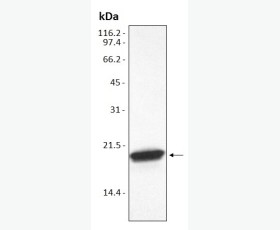Recombinant Human Biglycan/BGN
| Product name: | Recombinant Human Biglycan/BGN |
| Source: | Human Cells |
| Purity: | Greater than 95% as determined by reducing SDS-PAGE. |
| Buffer Formulation: | Lyophilized from a 0.2 μm filtered solution of 20mM PB, 150mM NaCl, pH 7.2. |
| Applications: | Applications:SDS-PAGE; WB; ELISA; IP. |
| Storage: | Avoid repeated freeze/thaw cycles. Store at 2-8 oC for one month. Aliquot and store at -80 oC for 12 months. |
| UOM: | 100ug/50ug/200ug/1mg/1g |
| Source | Human Cells |
| Description | Recombinant Human Biglycan is produced by our Mammalian expression system and the target gene encoding Glu20-Lys368 is expressed with a 6His tag at the C-terminus. |
| Names | Biglycan, Bone/Cartilage Proteoglycan I, PG-S1, BGN, SLRR1A |
| Accession # | P21810 |
| Formulation | Lyophilized from a 0.2 μm filtered solution of 20mM PB, 150mM NaCl, pH 7.2. |
| Shipping |
The product is shipped at ambient temperature. |
| Reconstitution |
Always centrifuge tubes before opening. Do not mix by vortex or pipetting. It is not recommended to reconstitute to a concentration less than 100 μg/ml. Dissolve the lyophilized protein in ddH2O. Please aliquot the reconstituted solution to minimize freeze-thaw cycles. |
| Storage |
Lyophilized protein should be stored at < -20°C, though stable at room temperature for 3 weeks. Reconstituted protein solution can be stored at 4-7°C for 2-7 days. Aliquots of reconstituted samples are stable at < -20°C for 3 months. |
| Purity |
Greater than 95% as determined by reducing SDS-PAGE. |
| Endotoxin | Less than 0.1 ng/µg (1 IEU/µg) as determined by LAL test. |
| Amino Acid Sequence |
EQRGFWDFTLDDGPFMMNDEEASGADTSGVLDPDSVTPTYSAMCPFGCHCHLRVVQCSDLGLKSV PKEISPDTTLLDLQNNDISELRKDDFKGLQHLYALVLVNNKISKIHEKAFSPLRKLQKLYISKNH LVEIPPNLPSSLVELRIHDNRIRKVPKGVFSGLRNMNCIEMGGNPLENSGFEPGAFDGLKLNYLR ISEAKLTGIPKDLPETLNELHLDHNKIQAIELEDLLRYSKLYRLGLGHNQIRMIENGSLSFLPTL RELHLDNNKLARVPSGLPDLKLLQVVYLHSNNITKVGVNDFCPMGFGVKRAYYNGISLFNNPVPY WEVQPATFRCVTDRLAIQFGNYKKVDHHHHHH
|
| Background | Biglycan is a 200-350 kD proteoglycan consisting of a 45 kD core protein and two chrondroitin/dermatan sulfate glycosaminoglycan chains. Biglycan binds to TGF-ß. It also binds to collagen type I in low ionic strength (less than 3 mM phosphate) buffer. At higher ionic strengths, Biglycan does not bind to collagen type I. It enhances the inhibition effect of TGF-ß on osteoclast proliferation at a concentration of 4-20 mg/ml. It also prevents the attachment of CHO cells to fibronectin, with a 50% inhibition at 17-21 mg/ml. |














